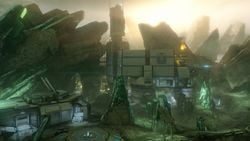Muroto: Difference between revisions
From Halopedia, the Halo wiki
Sith Venator (talk | contribs) |
NightHammer (talk | contribs) mNo edit summary |
||
| Line 4: | Line 4: | ||
==History== | ==History== | ||
Muroto was deemed more viable by the [[Materials Group]] for the specific mining they required. It was discovered early on that Muroto was incredibly rich with a particular light-weight, heavy-grade crystal needed for augmenting various armor composites. The mining facilities has faced many setbacks due to unrelenting storms and volcanic activity. | Muroto was deemed more viable by the [[Materials Group]] for the specific mining they required. Resources from Muroto were imported to [[Chi Ceti IV]] to be used in the creation of [[data crystal chip]]s for the [[SPARTAN-II program]].<ref>'''[[Halo: The Fall of Reach - The Animated Series]]''', ''Act Two''</ref> It was discovered early on that Muroto was incredibly rich with a particular light-weight, heavy-grade crystal needed for augmenting various armor composites. The mining facilities has faced many setbacks due to unrelenting storms and volcanic activity. | ||
==Trivia== | ==Trivia== | ||
| Line 19: | Line 19: | ||
**''[[Halo: Fall of Reach - Covenant|Covenant]]'' {{1st}} | **''[[Halo: Fall of Reach - Covenant|Covenant]]'' {{1st}} | ||
*''[[Halo 4]]'' | *''[[Halo 4]]'' | ||
*''[[Halo: The Fall of Reach - The Animated Series]]'' {{Mo}} | |||
==Sources== | ==Sources== | ||
Revision as of 12:51, March 16, 2016
Muroto is one of the two moons orbiting Chi Ceti IV.[1]
History
Muroto was deemed more viable by the Materials Group for the specific mining they required. Resources from Muroto were imported to Chi Ceti IV to be used in the creation of data crystal chips for the SPARTAN-II program.[2] It was discovered early on that Muroto was incredibly rich with a particular light-weight, heavy-grade crystal needed for augmenting various armor composites. The mining facilities has faced many setbacks due to unrelenting storms and volcanic activity.
Trivia
Gallery
Chi Ceti IV and its moons, including Muroto.
List of appearances
- Halo: Fall of Reach
- Covenant (First appearance)
- Halo 4
- Halo: The Fall of Reach - The Animated Series (Mentioned only)
Sources
- ^ Halo 4: The Essential Visual Guide, page 220
- ^ Halo: The Fall of Reach - The Animated Series, Act Two

